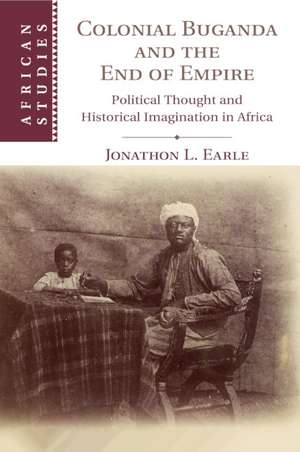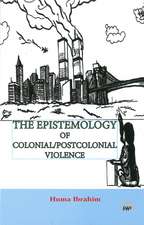Colonial Buganda and the End of Empire: Political Thought and Historical Imagination in Africa: African Studies, cartea 138
Autor Jonathon L. Earleen Limba Engleză Paperback – 12 feb 2020
| Toate formatele și edițiile | Preț | Express |
|---|---|---|
| Paperback (1) | 285.75 lei 6-8 săpt. | |
| Cambridge University Press – 12 feb 2020 | 285.75 lei 6-8 săpt. | |
| Hardback (1) | 695.06 lei 6-8 săpt. | |
| Cambridge University Press – 23 aug 2017 | 695.06 lei 6-8 săpt. |
Din seria African Studies
-
 Preț: 177.35 lei
Preț: 177.35 lei -
 Preț: 231.24 lei
Preț: 231.24 lei -
 Preț: 275.85 lei
Preț: 275.85 lei -
 Preț: 178.45 lei
Preț: 178.45 lei -
 Preț: 204.11 lei
Preț: 204.11 lei -
 Preț: 202.11 lei
Preț: 202.11 lei -
 Preț: 223.29 lei
Preț: 223.29 lei -
 Preț: 310.62 lei
Preț: 310.62 lei -
 Preț: 342.31 lei
Preț: 342.31 lei - 11%
 Preț: 696.80 lei
Preț: 696.80 lei -
 Preț: 184.93 lei
Preț: 184.93 lei -
 Preț: 238.11 lei
Preț: 238.11 lei -
 Preț: 177.35 lei
Preț: 177.35 lei -
 Preț: 208.25 lei
Preț: 208.25 lei -
 Preț: 299.45 lei
Preț: 299.45 lei - 22%
 Preț: 326.14 lei
Preț: 326.14 lei - 15%
 Preț: 459.92 lei
Preț: 459.92 lei - 13%
 Preț: 295.49 lei
Preț: 295.49 lei - 13%
 Preț: 296.11 lei
Preț: 296.11 lei - 18%
 Preț: 1007.12 lei
Preț: 1007.12 lei - 18%
 Preț: 1050.78 lei
Preț: 1050.78 lei -
 Preț: 446.37 lei
Preț: 446.37 lei - 12%
 Preț: 301.75 lei
Preț: 301.75 lei - 25%
 Preț: 770.26 lei
Preț: 770.26 lei -
 Preț: 110.05 lei
Preț: 110.05 lei - 18%
 Preț: 1106.02 lei
Preț: 1106.02 lei -
 Preț: 480.24 lei
Preț: 480.24 lei - 18%
 Preț: 1003.30 lei
Preț: 1003.30 lei - 18%
 Preț: 182.41 lei
Preț: 182.41 lei -
 Preț: 486.80 lei
Preț: 486.80 lei -
 Preț: 489.10 lei
Preț: 489.10 lei -
 Preț: 477.72 lei
Preț: 477.72 lei - 25%
 Preț: 853.03 lei
Preț: 853.03 lei - 18%
 Preț: 179.93 lei
Preț: 179.93 lei - 26%
 Preț: 762.16 lei
Preț: 762.16 lei -
 Preț: 321.93 lei
Preț: 321.93 lei - 18%
 Preț: 710.05 lei
Preț: 710.05 lei - 13%
 Preț: 311.00 lei
Preț: 311.00 lei -
 Preț: 273.50 lei
Preț: 273.50 lei - 18%
 Preț: 995.09 lei
Preț: 995.09 lei - 18%
 Preț: 703.45 lei
Preț: 703.45 lei -
 Preț: 322.12 lei
Preț: 322.12 lei -
 Preț: 287.48 lei
Preț: 287.48 lei -
 Preț: 286.69 lei
Preț: 286.69 lei
Preț: 285.75 lei
Nou
Puncte Express: 429
Preț estimativ în valută:
54.69€ • 56.66$ • 45.64£
54.69€ • 56.66$ • 45.64£
Carte tipărită la comandă
Livrare economică 21 martie-04 aprilie
Preluare comenzi: 021 569.72.76
Specificații
ISBN-13: 9781108404365
ISBN-10: 1108404367
Pagini: 299
Ilustrații: 25 b/w illus. 2 maps 1 table
Dimensiuni: 152 x 228 x 15 mm
Greutate: 0.4 kg
Editura: Cambridge University Press
Colecția Cambridge University Press
Seria African Studies
Locul publicării:Cambridge, United Kingdom
ISBN-10: 1108404367
Pagini: 299
Ilustrații: 25 b/w illus. 2 maps 1 table
Dimensiuni: 152 x 228 x 15 mm
Greutate: 0.4 kg
Editura: Cambridge University Press
Colecția Cambridge University Press
Seria African Studies
Locul publicării:Cambridge, United Kingdom
Cuprins
Introduction: power and history writing in colonial Buganda; 1. Ignatius K. Musazi: powerful kings and colonial economies, c.1905–c.1949; 2. Eridadi M.K. Mulira: cosmopolitanism and citizenship, c.1909–c.1949; 3. Eridadi M.K. Mulira: Buganda's status in Uganda, c.1953–c.1959; 4. Abubakar K. Mayanja: pluralism and Islamic political thought, c.1844–c.1962; 5. Benedicto K.M. Kiwanuka: justice and Catholic dissent, c.1879–c.1962; Conclusion: textual production and historical imagination in postcolonial Buganda.
Recenzii
'Buganda is one of the most studied societies in sub-Saharan Africa, but in this thoughtful and innovative book Jonathon L. Earle shows us how much more there is to explore. Using a series of illuminating case studies, based on pioneering research in private archives, Earle demonstrates how vivid, and how complex, were the political and historical imaginations of the kingdom's leading intellectuals in the late colonial moment. This book represents a thrilling new strand in Ganda historiography, and scholars of Uganda, and intellectual historians more broadly, owe Jonathon L. Earle a debt of gratitude.' Richard Reid, School of Oriental and African Studies, University of London
'With this book Earle becomes a leader in re-thinking the history of African nationalisms. His scrutiny of private papers undiscovered by previous historians allows us to eavesdrop on the political thought of late-colonial activists as never before. Widely read in comparative politics, they thought deeply, from different religious viewpoints, Christian, Muslim, and 'popular', about political responsibility and obligation – with a view to the right governance of their kingdom.' John Lonsdale, Emeritus Professor, Fellow of Trinity College Cambridge
'Essentially, this is an important examination of the end of empire in Uganda during the 1950s and 1960s. Many interviews with survivors from this period as well as careful analysis of a cornucopia of written sources make this a major study of a vital period in mid-twentieth century African history.' Michael Twaddle, University of London
'This unique book offers carefully constructed intellectual biographies of four critical patriots of Uganda's independence era: Musazi, Mulira, Abu Mayanja and Kiwanuka. Their historical imaginations and deep political commitments come alive through Earle's meticulous research. No other historian of Buganda has used these sources.' Holly Hanson, Mount Holyoke College, Massachusetts
'The most exciting thing about this valuable new book is the insight that it sheds into the mechanics of political innovation. The Ganda intellectuals who are the book's subjects mined their libraries, looking for snippets of text that could expand old ideas and launch new ways of thinking about public life. Earle's meticulous book helps us see how an African people defined and debated the principles that held them together.' Derek R. Peterson, University of Michigan
'I strongly recommend you read this book. Jonathon L. Earle uses evidence from some one hundred authoritative individuals, thirty-three official and private archives as well as from hundreds of secondary sources to show that multiple literacies conditioned the political behavior and actions of Buganda's political activists towards the end of British rule in Buganda. Sources of their inspiration for imagining the kingdom they wanted were Buganda's past, Christian and Islamic literacies as well as European political and intellectual thought. Multiplicity of literacies created ambiguity and plurality of the vision of the state for both the activists and departing administrators with the British Empire.' A. B. K. Kasozi, Makerere Institute of Social Research, Makerere University Kampala, Uganda
'This book effectively demonstrates the multiplicity of conceptualizations of political futures in the late colonial Buganda kingdom, emphasizing especially the roles of religious and historical interpretation in defining political preferences … of interest to scholars of African studies, intellectual history, and religious studies. Highly Recommended.' M. M. Heaton, Choice
'Earle's work in elaborating the intellectual journeys of these individuals is vivid and methodologically innovative. It reclaims fragmentary sources and interprets intellectual leaps to emphasize a contingent and creative literary culture connecting diverse narratives of Uganda's history, religious ideas, and secular visions of progress, development, and (sometimes) democracy.' Carol Summers, African Studies Review
'With this book Earle becomes a leader in re-thinking the history of African nationalisms. His scrutiny of private papers undiscovered by previous historians allows us to eavesdrop on the political thought of late-colonial activists as never before. Widely read in comparative politics, they thought deeply, from different religious viewpoints, Christian, Muslim, and 'popular', about political responsibility and obligation – with a view to the right governance of their kingdom.' John Lonsdale, Emeritus Professor, Fellow of Trinity College Cambridge
'Essentially, this is an important examination of the end of empire in Uganda during the 1950s and 1960s. Many interviews with survivors from this period as well as careful analysis of a cornucopia of written sources make this a major study of a vital period in mid-twentieth century African history.' Michael Twaddle, University of London
'This unique book offers carefully constructed intellectual biographies of four critical patriots of Uganda's independence era: Musazi, Mulira, Abu Mayanja and Kiwanuka. Their historical imaginations and deep political commitments come alive through Earle's meticulous research. No other historian of Buganda has used these sources.' Holly Hanson, Mount Holyoke College, Massachusetts
'The most exciting thing about this valuable new book is the insight that it sheds into the mechanics of political innovation. The Ganda intellectuals who are the book's subjects mined their libraries, looking for snippets of text that could expand old ideas and launch new ways of thinking about public life. Earle's meticulous book helps us see how an African people defined and debated the principles that held them together.' Derek R. Peterson, University of Michigan
'I strongly recommend you read this book. Jonathon L. Earle uses evidence from some one hundred authoritative individuals, thirty-three official and private archives as well as from hundreds of secondary sources to show that multiple literacies conditioned the political behavior and actions of Buganda's political activists towards the end of British rule in Buganda. Sources of their inspiration for imagining the kingdom they wanted were Buganda's past, Christian and Islamic literacies as well as European political and intellectual thought. Multiplicity of literacies created ambiguity and plurality of the vision of the state for both the activists and departing administrators with the British Empire.' A. B. K. Kasozi, Makerere Institute of Social Research, Makerere University Kampala, Uganda
'This book effectively demonstrates the multiplicity of conceptualizations of political futures in the late colonial Buganda kingdom, emphasizing especially the roles of religious and historical interpretation in defining political preferences … of interest to scholars of African studies, intellectual history, and religious studies. Highly Recommended.' M. M. Heaton, Choice
'Earle's work in elaborating the intellectual journeys of these individuals is vivid and methodologically innovative. It reclaims fragmentary sources and interprets intellectual leaps to emphasize a contingent and creative literary culture connecting diverse narratives of Uganda's history, religious ideas, and secular visions of progress, development, and (sometimes) democracy.' Carol Summers, African Studies Review
Notă biografică
Descriere
This book offers an intellectual history of colonial Buganda, using previously unseen archives to recast the end of empire in East Africa.



